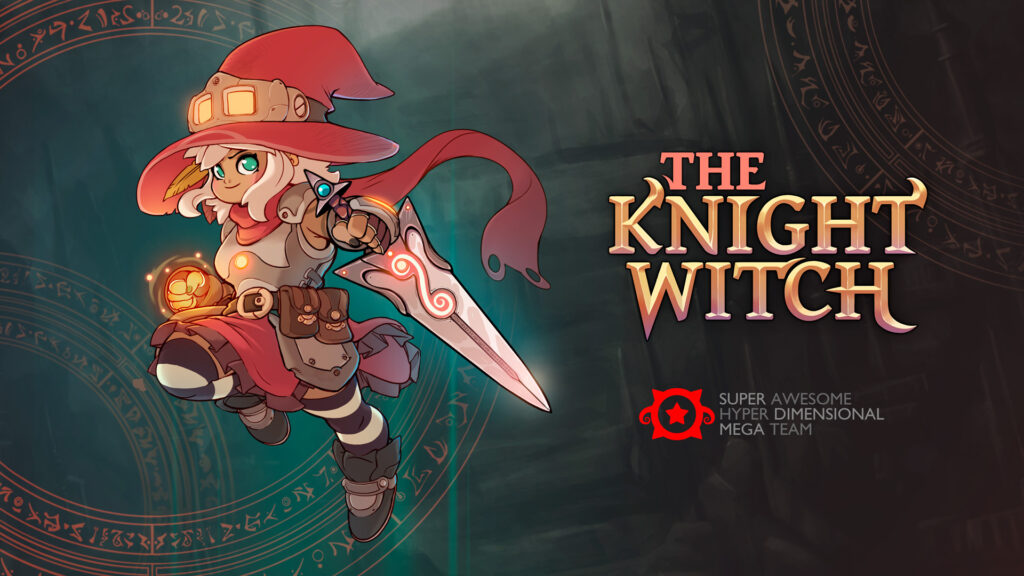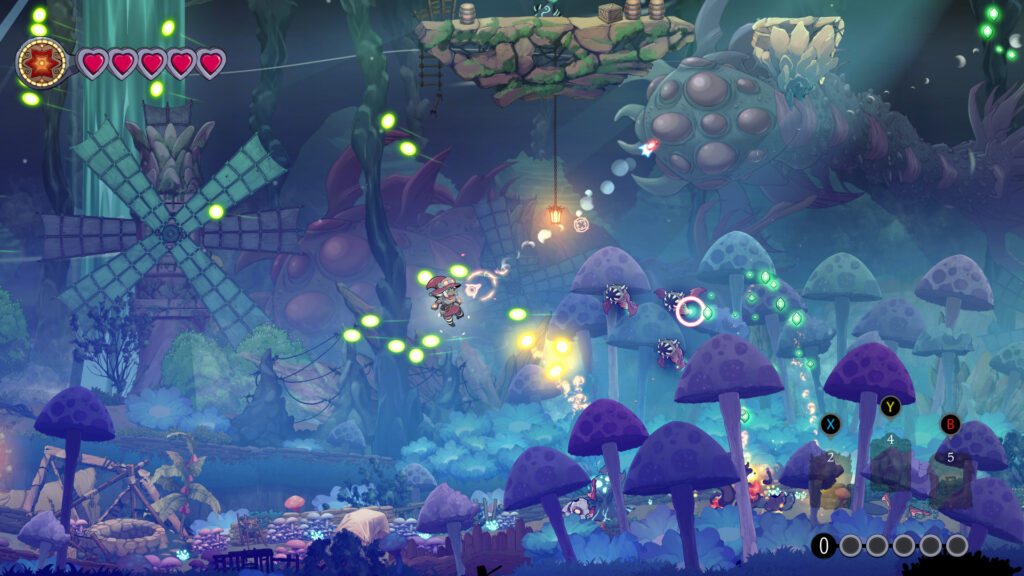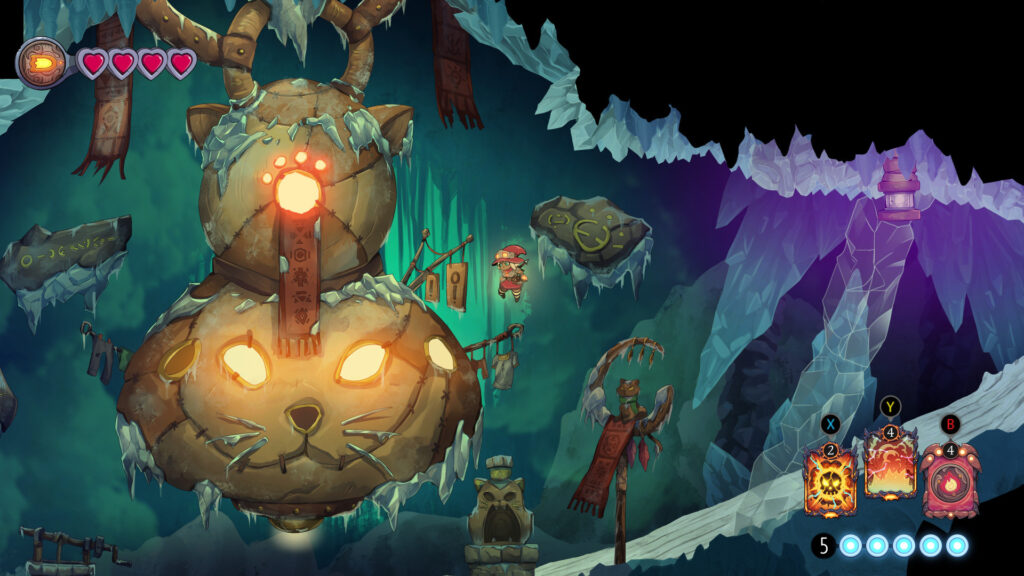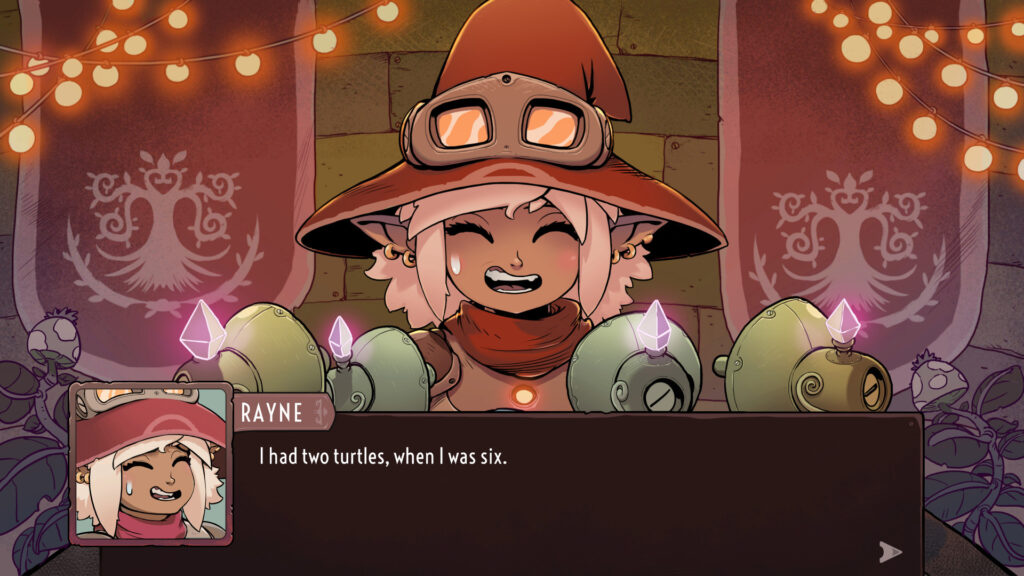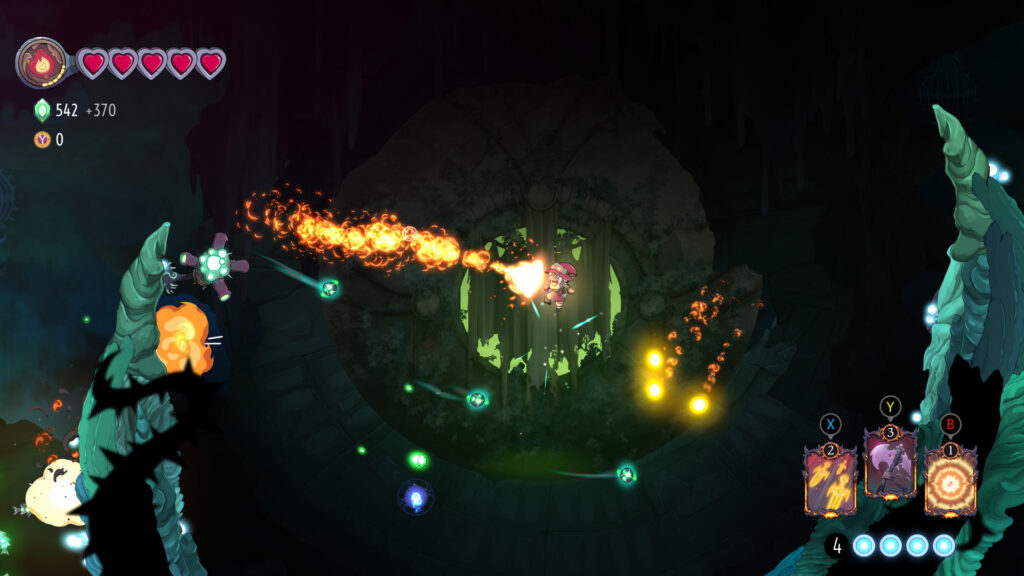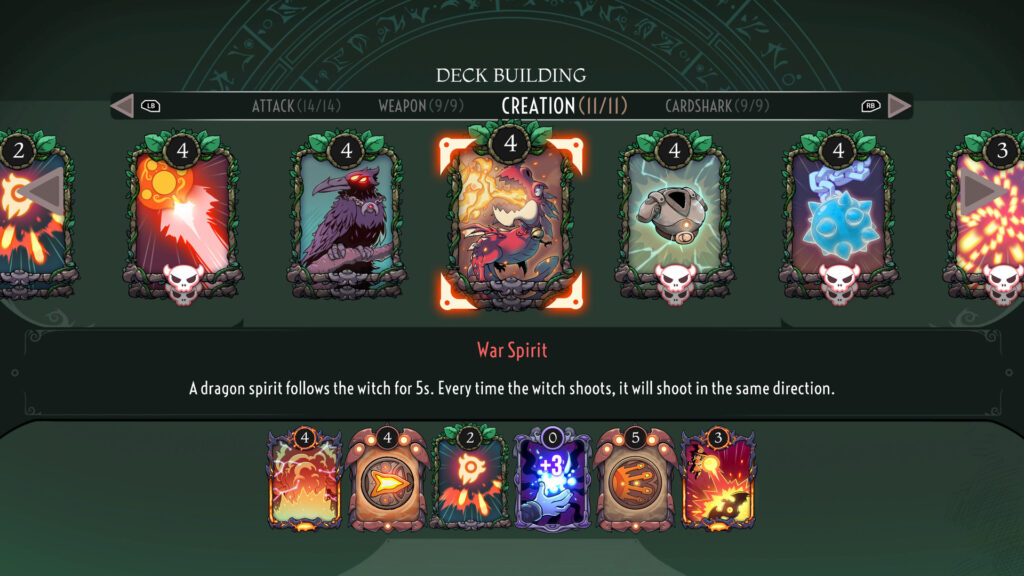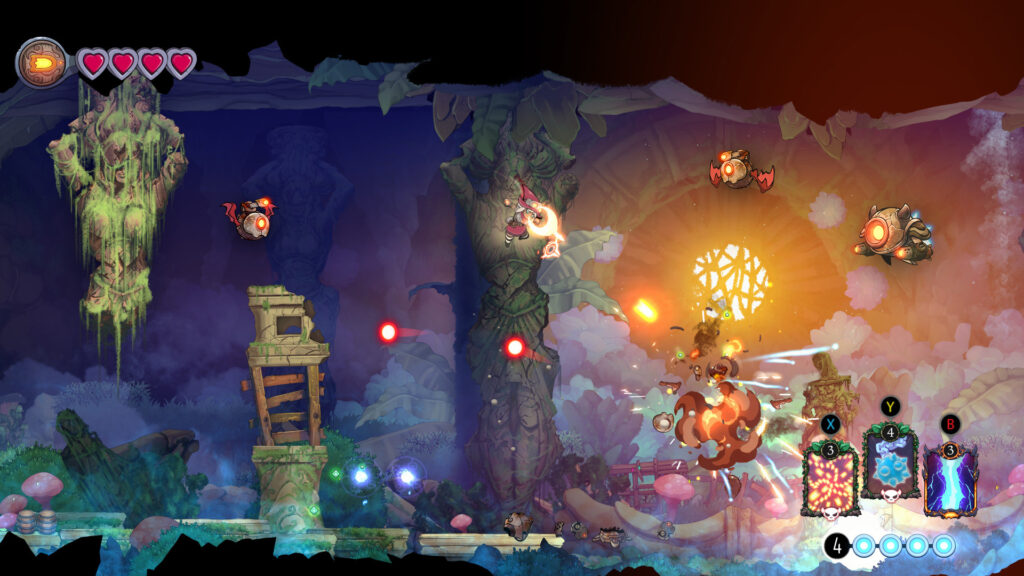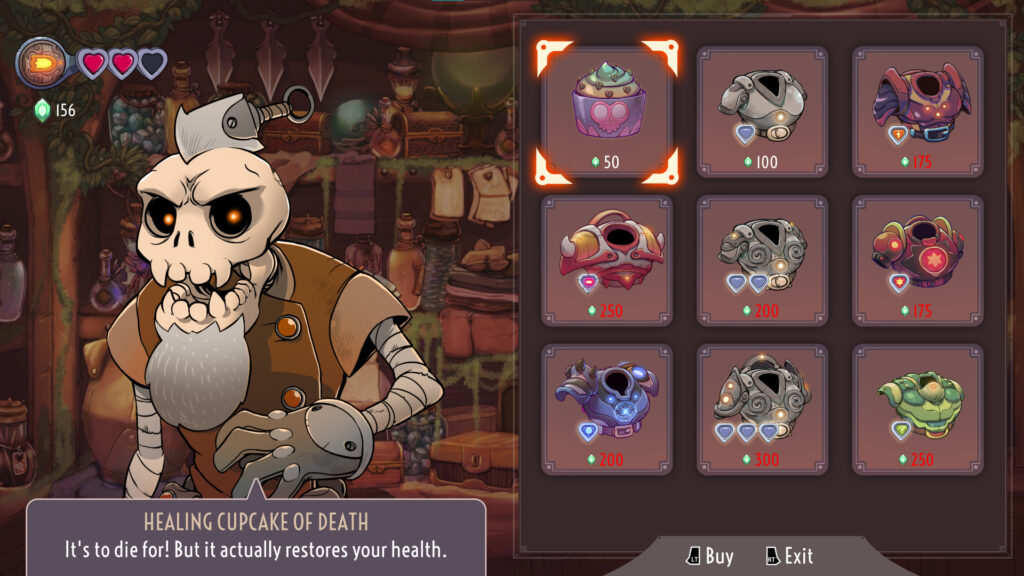Platforms: PC, PlayStation, Nintendo Switch, Xbox
[Review code provided by Team 17]The Knight Witch is the answer to a very specific question: what would happen if you took metroidvania style exploration, shoot ’em up action and deck-building strategy, then stuffed them into a blender and made a game out of the resulting goop?
The result is a compelling experience, but not one without flaws. The Knight Witch has interesting ideas throughout, but things don’t always come together as cleanly as they could. However, what it does well is strong enough to hold things afloat on the whole.
Players take on the role of Rayne, one of five Knight Witches. Knight Witches are powerful beings who, through a power known as ‘links’, connect to the people around them and become empowered by their feelings of trust.
Although she was chosen as one of the original Knight Witches, Rayne was too weak to join the battle of the broken sky – an event that saw civilisation forced underground to avoid the consequences of aggressive industrialisation by an evil empire. Staying on the surface has been rendered impossible by massive cracks in the sky, through which deadly sunlight burns anything it touches.
However, some years later, an army of War Golems attacks Dungeonidas and shatters the long-enjoyed peace of its people. To protect her loved ones and her home, Rayne must finally muster her strength, gain the trust of the people, and fight as a Knight Witch.
Throughout the game the story manifests in interesting ways, although its various elements lack cohesion and can feel undercooked. As an example, Knight Witches are essentially powered up by their popularity. Rescuing people and helping them out allows Rayne to make new links, which in turn increase her level and unlock new skills. This is one of the story’s driving concepts.
Post mission press conferences provide the game’s most obvious moral challenges, as Rayne will have to decide how to respond to a variety of tough questions about her deeds. By being creative with the truth and covering up unpleasant news, she can gain trust – and power – more quickly.
However, Rayne is a goody-two-shoes and the game makes it quite clear that lying is the ‘bad’ choice. Rayne looks visibly uncomfortable telling lies and steers the player towards the truth through constant internal monologue. There’s no tangible disadvantage to being honest, either – players can spend fragments (the game’s currency) to bribe the people for their trust and make up the links they missed out on.
Unfortunately, these moral decisions also don’t seem to matter long-term. In the immediate aftermath characters will respond to what you say in the press conferences, but the game’s endings seem to hinge on your final decision more heavily than anything you did during the game. The story otherwise appears to flow in a particular way, regardless of the choices you made. All of this somewhat dulls the game’s attempt at making a moral point.
That said, there’s still plenty to like about the story, and The Knight Witch also boasts excellent presentation and gameplay to boot. The game is visually gorgeous, with an attractive art style, cute character designs and interesting underground environments to explore.
Moving about and shooting feels very smooth, and with a choice of 40 spell cards to unlock and equip, Rayne’s arsenal can be highly customisable. Mechanically, the game has a lot going for it and it stands out among other metroidvanias which stick to emulating the style of the genre’s progenitors.
However, it does have some problems holding it back. Frankly, the game is very difficult, and a large part of that difficulty comes from design decisions that feel unfair. Combat frequently takes place in closed spaces where it’s difficult to manouvre. Rayne’s shots have limited range, forcing you to stick close to enemies – many of which are on the spongy side. This is a serious problem in the game’s tighter corridors, where enemy fire can become impossible to avoid.
It can also be hard to read the game’s combat, as the detailed backgrounds – while very pretty – add to visual clutter when there’s a lot of enemies and projectiles (which is most of the time). Rayne’s hitbox is ambiguous and feels too large to reliably dodge through many bullet patterns, and your health is very limited. By the end of the game I could only take 5 hits in total, and (by default) health drops are fixed. Some areas will ask you to cross several bullet-filled screens before you’ll have chance to recover even a single heart.
When you die, you’re kicked back to the last checkpoint you touched, Dark Souls style. With no fast travel and frequent back-tracking, this meant repeating sections over and over until I found myself mashing the dash button and ignoring combat as much as I could.
The Knight Witch makes a point to boast of accessibility features like auto-aim (which, frankly, is a necessity in hectic fights) and options to adjust the difficulty to your level of ability. However, these options are very much ‘over-promise and under-deliver’.
Firstly, said ‘options’ are actually cheats which you have to unlock via secret codes. I’m not sure where you’re meant to actually get these codes from, because I never found them in game – I had to look up a Steam discussion thread. It’s a baffling choice to make your advertised accessibility options inaccessible by default and then patronise players with an achievement (‘Cheaters are also winners!’) for using them.
Secondly, the options aren’t even that good. There’s only a handful of cheats, and they don’t offer a lot of nuance. If you’re finding it hard to stay alive, you can make it so that enemies drop health (far too often) or… make yourself invincible. If you’re having trouble with mana management, you can… make it infinite, making cards spammable and completely breaking the game’s balance. You’re essentially stuck between a game that’s viciously hard or completely trivial.
All in all though, The Knight Witch is still a very enjoyable game. My playthrough lasted about 12 hours, and I left several secrets uncovered – all in all you could probably get about 15 hours or more out of a 100% playthrough.
The gameplay has its flaws, but is still very satisfying overall – the buttery smooth movement and the compelling deck-building aspects give the game a unique twist that most metroidvanias can’t offer. The story has its problems – the writing is a bit twee and clumsy about expressing its morals – but the characters are likeable, and it’s far from being a bad story on the whole.
Overall, I think it’s a game that could still be improved, but one that’s more than worth checking out.
Final Score
Summary
The Knight Witch brings a unique blend of genres together into a game that, while flawed, has a lot of polish and is a lot of fun on the whole. The attractive visuals and smooth gameplay are the game’s standout points.
Some players might be put off by the challenging difficulty and a lack of meaningful options to adjust the game to their level of skill. As well as this, the story is a bit hit-and-miss, with moral choices that end up lacking weight and writing that can be a bit too cutesy, undercutting the game’s more serious messages.
Hopefully some of these aspects can be improved in the future, but it’s still worth trying The Knight Witch out. There’s a lot to like about it.

